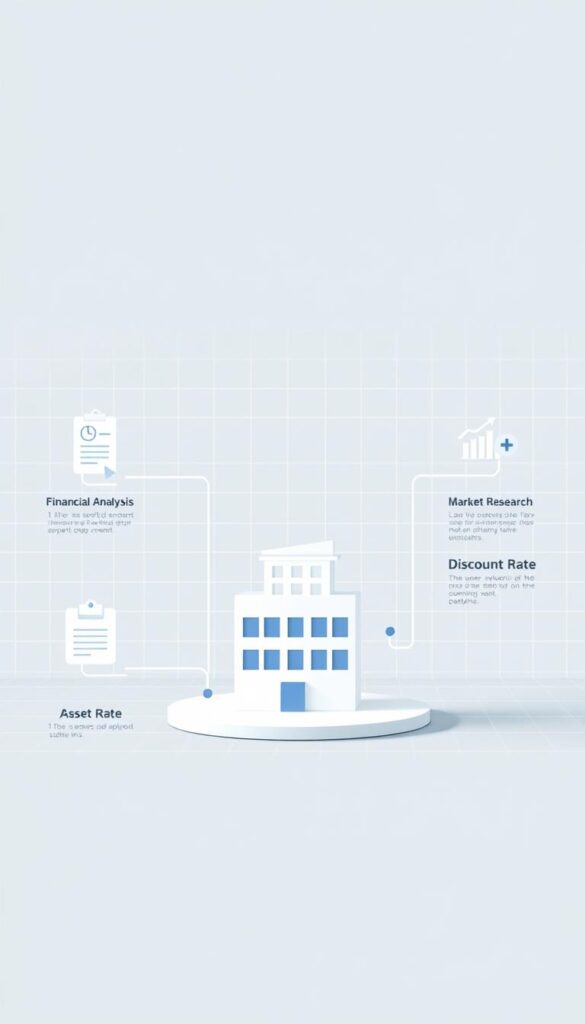Do you really know what your business is worth? Or do you think it’s just about your profits each year? Learning how to value your business is more than just a financial task. It’s key for big decisions like selling, getting loans, or planning for retirement.
This guide will show you how to value your business step by step. You’ll see why knowing your business’s worth is important for owners and investors. From figuring out why you need a valuation to looking at past performance and picking the best method, each step is important.
Key Takeaways
- Understanding the purpose of your business valuation is essential for effective decision-making.
- Gathering the right financial data is critical for an accurate assessment.
- Looking at historical performance gives insights into future prospects.
- Choosing the right valuation method is key to a fair value.
- Using several methods can make your valuation more accurate.
Introduction to Business Valuation
Business valuation is about figuring out a company’s worth. It uses methods like discounted cash flow, market comparable analysis, and asset-based evaluation. These help determine a business’s economic value.
Business owners might need a valuation when selling, investing, or planning strategies. By looking at financial data and market position, you can understand a company’s performance and growth. It’s important to examine financial metrics like revenue, earnings, and asset values.
This section is a key start to learning about business valuation. It helps you understand the importance of valuation. This knowledge is vital for exploring further strategies and methods.
Understanding the Importance of Business Valuation
Knowing the value of a business is key for many people. Business owners use these valuations to decide on selling, growing, or planning for the future. Investors look at these values to see if a business could be profitable, helping them choose where to put their money.
There are many times when knowing a company’s worth is essential. Legal fights, planning for gifts or estates, and disagreements in partnerships all need accurate valuations. Also, when businesses want to grow or get more money, creditors might ask for a valuation.

When we value a business, we look at many things. This includes the market and how much the owner is involved. This helps everyone make better choices about money and the future. It also makes sure financial reports are correct, which builds trust and openness in business.
In short, knowing the true value of a business is very important. It helps everyone make smart choices, whether it’s for growth, following rules, or solving problems.
Steps for Conducting a Business Valuation
Valuing a business involves several key steps to find its true worth. First, you need a valuation expert to guide you through the business valuation steps. Knowing why you’re valuing the business is also important. It shapes how you approach and use methods in the business appraisal process.
Next, you gather important data. This includes financial records and documents that support the valuation. Looking at the company’s past performance helps understand its financial health. It also sets a base for future predictions.
Then, you look ahead and estimate the business’s future. This means forecasting revenues and expenses. The Discounted Cash Flow (DCF) method is often used to calculate the present value of future cash flows. Choosing the right valuation method is key. You can use the market approach, income approach, or asset-based valuations.
Lastly, you compile all your findings into a detailed valuation report. This report gives a solid value for the business. It’s important to update this report regularly. Market changes and company performance can affect the valuation a lot.
How to Perform a Business Valuation: A Step-by-Step Guide
Valuing a business is a detailed process that helps make smart choices. It shows the business’s value and points out its good and bad sides. Start by figuring out why you need to value the business. This could be for selling, getting investors, or for legal reasons like divorce.
Then, collect all the financial records you need. A good business appraisal relies on current and complete financial statements. These include balance sheets, income statements, and cash flow statements. Looking at these documents helps understand how well the business is doing and its financial health.
Look at the business’s past performance by checking profit margins and revenue. This shows how the business has grown and can help predict its future. The discounted cash flow (DCF) method is often used, with a discount rate of 8-10% for tech companies. This method considers the value of money over time.
Choosing the right method to value a business is key. You can use the market-based method, comparing your business to similar ones. Or, you can use the income-based approach, which looks at projected cash flows. Asset-based methods are best for businesses with lots of physical assets. Businesses with more intangible assets might need more complex methods.
Getting help from professionals is important to make sure your valuation is right and can be defended. Economic conditions and growth rates affect your final valuation. So, it’s important to keep up with market trends.

Defining the Purpose of the Valuation
Understanding why we value a business is key. It guides how we do the valuation. Different reasons for valuing a business affect the methods and goals. Knowing the context helps meet the needs of all involved.
Common Scenarios for Business Valuation
Business valuation happens for many reasons. These include selling, merging, raising capital, or dealing with legal issues. For example, when owners want to sell, knowing the business’s value is vital for talks.
This value is also important in buy/sell agreements. These agreements happen when an owner dies or leaves the business.
Understanding Stakeholders’ Perspectives
It’s important to know what different groups want from a valuation. Owners might have personal feelings, investors look at money, and regulators check for rules. Each group has its own needs.
By understanding these, we can make sure the valuation meets everyone’s goals. This makes the process more effective and fair for all.

Gathering Relevant Data
Getting accurate data is key to a good business valuation. The quality of financial records greatly affects the assessment. Important documents include income statements, balance sheets, and cash flow statements. These show the company’s financial health.
Having a clear plan to collect these documents makes your evaluation more precise.
Types of Financial Records Needed
Here are the financial records you need for a reliable valuation:
- Income Statements: Show how well the company did over a certain time.
- Balance Sheets: Give a snapshot of the company’s financial state at a specific time.
- Cash Flow Statements: Help predict future performance by showing cash in and out.
- Tax Returns: Confirm the income and expenses reported by the company.
Additional Information to Prepare
Also, gather this extra data:
- Contracts: Show what the company owes and owns.
- Customer Agreements: Help understand revenue stability and customer ties.
- Market Data: Compare the business to industry standards.
- Historical Performance Metrics: Use past trends to forecast future success.

Assessing Company’s Historical Performance
Looking at a company’s past performance is key in figuring out its value. You need to do a deep dive into how the business has done over time. This means checking out its earnings, costs, and overall financial health from past years.
Tools like price-to-earnings ratios and price-to-book values help compare the company to others. By using these metrics, you can see how the company stacks up against its rivals. This helps in making better guesses about its future financial health.
Remembering the company’s past helps in making smart choices about its future. You might need to tweak cash flow predictions to match the company’s true capabilities. So, understanding the company’s past is essential for a fair valuation.

Determining the Future Outlook for the Business
Understanding a business’s future is key to seeing its growth and profit chances. This involves looking at two main things: how much money it might make and where it stands in the market. Knowing these helps investors make smart choices or plan the business’s path.
By checking out what the business might earn and how it compares to others, you get a better view. This helps you see where your business fits in the market.
Forecasting Future Revenues and Expenses
Good revenue forecasting helps predict cash flow for the next few years. It’s about guessing how much money will come in and how much will go out. Clear financial plans show what returns and risks are involved, making investors more confident.
Looking at past performance helps back up these forecasts. This way, you can make plans based on solid data, guiding your business forward.
Evaluating Market Position and Competitors
Doing a deep dive into your market position means studying your business against others. It shows what you’re good at and where you can grow. It also points out areas that need work.
This helps you plan strategies to keep or grow your market share. Keeping an eye on what others are doing lets you adjust your plans. This ensures you stay on track with market trends and find new ways to grow.

Choosing the Right Valuation Method
Choosing the right method for valuing your business is key to getting an accurate value. There are many business valuation methods out there. Knowing the strengths and when to use each can help you make a smart choice. The main methods are the market approach, income approach, and asset-based approach. Each one is best for different situations based on your business.
Market Approach
The market approach compares your business to similar ones by looking at price/earnings ratios. It’s great for mergers and acquisitions, where the market’s role is big. But, remember, market activity can make it hard to find good sales data, which might mess up the results.
Income Approach
The income approach looks at future cash flows and their present value, taking risk into account. It shows how well a business might grow. But, it’s the riskiest method because small changes in forecasts can greatly affect the value, more so in unstable times.
Asset-Based Approach
The asset-based approach values your business by looking at its net assets. It’s good for companies with lots of physical assets. Knowing the details of these methods helps you pick the best one for your business’s needs and future.
FAQ
What is business valuation and why is it important?
What are the key steps involved in conducting a business valuation?
What types of financial records should I gather for an accurate valuation?
How do historical performance metrics influence business valuation?
What valuation methods are available, and how do I choose the right one?
Why is it necessary to understand the purpose of the valuation?
How can I project future cash flows accurately?
What is the significance of gathering market data on comparable companies?
Source Links
- How to Value a Company: 6 Methods and Examples | HBS Online – https://online.hbs.edu/blog/post/how-to-value-a-company
- What is a Business Valuation and How Do You Calculate It? – https://www.uschamber.com/co/run/finance/how-to-calculate-business-valuation
- Business Valuation: Definition & How To Calculate Business Value (2025) – Shopify – https://www.shopify.com/blog/business-valuation
- Business Valuation: The Market Value Approach | Eqvista – https://eqvista.com/company-valuation/business-valuation-market-value-approach/
- Get Started on Introduction to Business Valuation | CFI – https://corporatefinanceinstitute.com/course/intro-business-valuation/
- Business Valuation Guide | Business Appraisals | Valuation Methods – https://www.adamsbrowncpa.com/business-valuations-understanding-value-business/
- Business Valuation: 6 Methods for Valuing a Company – https://www.investopedia.com/terms/b/business-valuation.asp
- Business valuation – how to assess the value a company – https://corporatevaluation.co/business-valuation-a-step-by-step-guide-to-valuing-a-company/
- How to value a business – https://www.british-business-bank.co.uk/business-guidance/guidance-articles/business-essentials/how-to-value-a-business
- How To Conduct a Small-Business Valuation – https://blog.hubspot.com/sales/small-business-valuation
- How to value a business – https://corporatevaluation.co/how-to-value-a-business-understanding-its-importance-and-methods-of-business-valuation/
- Top 5 Business Valuation Methods: Expert Guide – https://www.girolino.com/the-ultimate-guide-to-business-valuation-methods-unlocking-the-true-value-of-companies/
- Business valuation guide: approaches, methods, formulas – https://mnacommunity.com/insights/business-valuation-guide-approaches-methods-formulas/
- Basics of Business Valuation: A Guide for Business Owners in Indiana – https://www.hpindiana.law/business-blog/basics-of-business-valuation-a-guide-for-business-owners-in-indiana/
- Business Valuations: How to Value a Business – https://www.navixconsultants.com/the-exit-playbook/business-valuations-how-to-value-a-business
- Business Valuation: Importance, Formula and Examples – https://www.americanexpress.com/en-us/business/trends-and-insights/articles/business-valuation-importance-formula-and-examples/
- Step by step guide to understanding the business valuation process – https://techbullion.com/step-by-step-guide-to-understanding-the-business-valuation-process/
- Ready to Start the Business Valuation Process? Here’s What to Expect | Carr, Riggs & Ingram – https://www.criadv.com/insight/ready-to-start-the-business-valuation-process/
- The 10 Steps In The Business Valuation Process | Valentiam – https://www.valentiam.com/newsandinsights/business-valuation-process-10-steps
- Business Valuation Guide | Business Valuation Services – https://keitercpa.com/comprehensive-guide-to-business-valuations/
- How to Make a Business Valuation Report – Step-by-Step Guide – https://exitwise.com/blog/business-valuation-report
- Projections in a Business Valuation – https://businessappraisalflorida.com/blog/projections-in-a-business-valuation/
- Five Steps to Reach the Business Value Conclusion – https://www.valuadder.com/valuationguide/business-valuation-five-steps.html
- How to Calculate Business Valuation – https://experiencehfs.com/a-detailed-guide-on-how-to-calculate-business-valuation
- Valuation Methods: A Guide – https://www.valentiam.com/newsandinsights/valuation-methods
- What are the steps to choose the best valuation method for your company? – https://www.linkedin.com/advice/1/what-steps-choose-best-valuation-method-your-5grce
- How Much Is Your Business Worth? – https://www.business.com/articles/four-simple-steps-to-valuing-your-small-business/